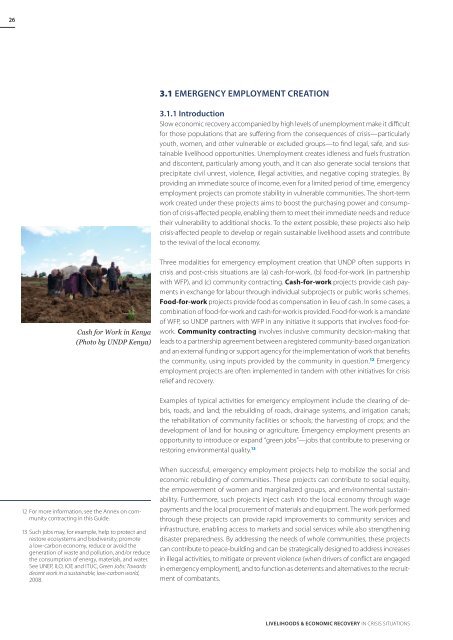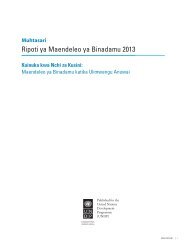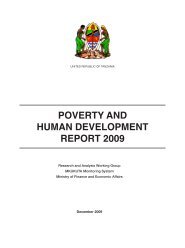Download PDF (4.08 MB) - ReliefWeb
Download PDF (4.08 MB) - ReliefWeb
Download PDF (4.08 MB) - ReliefWeb
Create successful ePaper yourself
Turn your PDF publications into a flip-book with our unique Google optimized e-Paper software.
26<br />
3.1 Emergency employment creation<br />
3.1.1 Introduction<br />
Slow economic recovery accompanied by high levels of unemployment make it difficult<br />
for those populations that are suffering from the consequences of crisis—particularly<br />
youth, women, and other vulnerable or excluded groups—to find legal, safe, and sustainable<br />
livelihood opportunities. Unemployment creates idleness and fuels frustration<br />
and discontent, particularly among youth, and it can also generate social tensions that<br />
precipitate civil unrest, violence, illegal activities, and negative coping strategies. By<br />
providing an immediate source of income, even for a limited period of time, emergency<br />
employment projects can promote stability in vulnerable communities. The short-term<br />
work created under these projects aims to boost the purchasing power and consumption<br />
of crisis-affected people, enabling them to meet their immediate needs and reduce<br />
their vulnerability to additional shocks. To the extent possible, these projects also help<br />
crisis-affected people to develop or regain sustainable livelihood assets and contribute<br />
to the revival of the local economy.<br />
Cash for Work in Kenya<br />
(Photo by UNDP Kenya)<br />
Three modalities for emergency employment creation that UNDP often supports in<br />
crisis and post-crisis situations are (a) cash-for-work, (b) food-for-work (in partnership<br />
with WFP), and (c) community contracting. Cash-for-work projects provide cash payments<br />
in exchange for labour through individual subprojects or public works schemes.<br />
Food-for-work projects provide food as compensation in lieu of cash. In some cases, a<br />
combination of food-for-work and cash-for-work is provided. Food-for-work is a mandate<br />
of WFP, so UNDP partners with WFP in any initiative it supports that involves food-forwork.<br />
Community contracting involves inclusive community decision-making that<br />
leads to a partnership agreement between a registered community-based organization<br />
and an external funding or support agency for the implementation of work that benefits<br />
the community, using inputs provided by the community in question. 12 Emergency<br />
employment projects are often implemented in tandem with other initiatives for crisis<br />
relief and recovery.<br />
Examples of typical activities for emergency employment include the clearing of debris,<br />
roads, and land; the rebuilding of roads, drainage systems, and irrigation canals;<br />
the rehabilitation of community facilities or schools; the harvesting of crops; and the<br />
development of land for housing or agriculture. Emergency employment presents an<br />
opportunity to introduce or expand “green jobs”—jobs that contribute to preserving or<br />
restoring environmental quality. 13<br />
12 For more information, see the Annex on community<br />
contracting in this Guide.<br />
13 Such jobs may, for example, help to protect and<br />
restore ecosystems and biodiversity, promote<br />
a low-carbon economy, reduce or avoid the<br />
generation of waste and pollution, and/or reduce<br />
the consumption of energy, materials, and water.<br />
See UNEP, ILO, IOE and ITUC, Green Jobs: Towards<br />
decent work in a sustainable, low-carbon world,<br />
2008.<br />
When successful, emergency employment projects help to mobilize the social and<br />
economic rebuilding of communities. These projects can contribute to social equity,<br />
the empowerment of women and marginalized groups, and environmental sustainability.<br />
Furthermore, such projects inject cash into the local economy through wage<br />
payments and the local procurement of materials and equipment. The work performed<br />
through these projects can provide rapid improvements to community services and<br />
infrastructure, enabling access to markets and social services while also strengthening<br />
disaster preparedness. By addressing the needs of whole communities, these projects<br />
can contribute to peace-building and can be strategically designed to address increases<br />
in illegal activities, to mitigate or prevent violence (when drivers of conflict are engaged<br />
in emergency employment), and to function as deterrents and alternatives to the recruitment<br />
of combatants.<br />
Livelihoods & Economic Recovery in Crisis Situations





